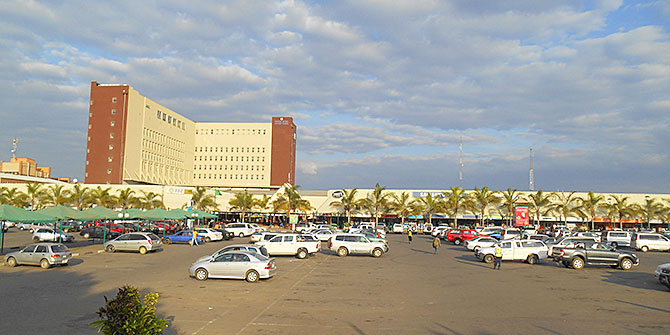In The Road to Soweto: Resistance and the Uprising of 16 June 1976, Julian Brown presents a revisionary account of the Soweto Uprising of June 1976, arguing that the decade leading up to this event was marked a series of experimental resistance which prepared the ground for this uprising. Anne Heffernan says that this volume could not have come at a more appropriate time.
In June 2016 South Africa marked the fortieth anniversary of the Soweto Students’ Uprising of 1976. Historians and other commentators have widely acknowledged this moment as one of the most pivotal shifts in the anti-apartheid struggle, and in South African politics during the twentieth century. This year’s anniversary came on the heels of renewed waves of student protests across South Africa – the biggest the country has seen since the advent of multi-racial democracy in 1994. Given the particularity of this historical moment, Julian Brown’s The Road to Soweto: Resistance and the Uprising of 16 June 1976 could scarcely be more timely.
 Brown, a lecturer in political studies at the University of the Witwatersrand in Johannesburg, is also the author of the recent South Africa’s Insurgent Citizens: On Dissent and the Possibility of Politics (Zed Books, 2015), which explored the remaking of political possibility through forms of protest in contemporary South Africa. In The Road to Soweto he traces the historical roots of some of these forms of protest, reflecting on political innovations and adaptations during the 1960s and 1970s that effectively transformed the ways in which ordinary South Africans were able to protest against the state. The period covered, between the state’s brutal massacre at Sharpeville in 1960 and the Soweto Uprising in 1976, has often been described as ‘quiescent’ in South African historiography. It has been read as an interregnum during which the state consolidated its control and political dissent was expressed privately, punctuated by occasional, isolated incidents of public dissent. Brown subverts this conventional narrative by analysing and linking many of these political ‘experiments’, and tracing their collective impact on the moment that changed the course of public anti-apartheid politics in South Africa: the Soweto Uprising.
Brown, a lecturer in political studies at the University of the Witwatersrand in Johannesburg, is also the author of the recent South Africa’s Insurgent Citizens: On Dissent and the Possibility of Politics (Zed Books, 2015), which explored the remaking of political possibility through forms of protest in contemporary South Africa. In The Road to Soweto he traces the historical roots of some of these forms of protest, reflecting on political innovations and adaptations during the 1960s and 1970s that effectively transformed the ways in which ordinary South Africans were able to protest against the state. The period covered, between the state’s brutal massacre at Sharpeville in 1960 and the Soweto Uprising in 1976, has often been described as ‘quiescent’ in South African historiography. It has been read as an interregnum during which the state consolidated its control and political dissent was expressed privately, punctuated by occasional, isolated incidents of public dissent. Brown subverts this conventional narrative by analysing and linking many of these political ‘experiments’, and tracing their collective impact on the moment that changed the course of public anti-apartheid politics in South Africa: the Soweto Uprising.
Brown identifies and challenges two major dichotomies in the way the historiography of protest in South Africa has been written: the division between students’ movements and workers’ movements, and the division – particularly within the students’ movements – between white and black protest. This challenge enables him to read the period of the 1960s and early 1970s differently, as a time when an “unplanned series of experiments” implemented by a range of political actors came together to permit the “emergence of a new opposition” in South African politics.
By linking protest on white university campuses in the mid 1960s to the black South African Students’ Organisation (SASO) which was founded at the end of the decade, The Road to Soweto avoids using the racial division imposed by the apartheid state as a categorical tool. Though the black and white university students in Brown’s account were frequently at odds with one another, he argues that the ideological and practical experiments their movements undertook were mutually influential in expanding the form and space for public protest.

Photo Credit: GL Craig via Flickr (http://bit.ly/2cSPjzj) CC BY-NC-ND 2.0
Into this space, the Durban strikes of 1973 brought a new demographic of South African society: black workers. From January to March 1973, more than 60,000 black workers went on strike across the city, in the largest industrial action since the institution of apartheid. A decade before the politicisation of South Africa’s trade unions, Brown argues the Durban strikes seized space for dissenting protest that had been opened by student movements. He also contends that the strikes and the student protests were shaped by the state’s response to them. This reached its pre-Soweto confrontational peak with the pro-Frelimo rallies of 1974, which resulted in violent clashes between protestors and armed police and their dogs.
Two years later, images of confrontations between Soweto schoolchildren and armed policemen became the icons of struggle. This marked a new era for South African politics of resistance. But as Brown argues, this moment was the culmination of more than a decade in which students and workers experimented with resistance on their campuses and in their factories. It moved beyond the new imaginings of the protests before it, and ‘carved out a material space’ beyond state control. The Road to Soweto concludes by pointing to the importance of the Uprising for what came after it; the 1980s became the decade of ungovernability in townships, and of mass public protest. Without falling into a neat teleology, Brown makes a compelling case for how the road to Soweto was paved by the protest experiments of students and workers during the long decade before 1976, and he provides some hints at the end of his analysis of how that road has wound into contemporary South Africa.
The Road to Soweto: Resistance and the Uprising of 16 June 1976. Julian Brown. James Currey. 2016
Anne Heffernan is a Postdoctoral Fellow with the History Workshop, University of the Witwatersrand in South Africa. Follow her on Twitter @AnneHeffernan84.
The views expressed in this post are those of the authors and in no way reflect those of the Africa at LSE blog or the London School of Economics and Political Science.





